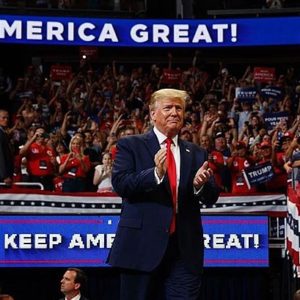No state punches above its weight in national politics like New Hampshire. And so, while the mantra of the 2020 campaign media coverage is “Michigan, Pennsylvania and Wisconsin,” the Trump campaign is not overlooking the Granite State. Far from it.
“New Hampshire is one of those states that has been trending the right way for us, and we feel like this is the cycle where we finally bring it home,” says Rick Gorka, deputy communications director with the Republican National Committee and a veteran of the Mitt Romney campaign. “I think that we’re more organized and running a better campaign than we probably ever have in the state.”
After polling well behind Hillary Clinton during the 2016 campaign, Trump ended up losing Hew Hampshire by just 2,700 votes. “And how do you find those extra 2,700 voters and turn them out? It’s the data, the information that allows you to identify, connect and motivate them. And quite frankly, we’re just better at it than the Democrats,” Gorka said.
For months, including throughout the coronavirus crisis, Trump 2020 has been doing voter outreach, using Zoom and other suddenly ubiquitous tech to get Granite State supporters in touch with potential voters. “Since March 13, more than 300,000 people signed up across the country to volunteer with the campaign,” John Pence, senior advisor for President Trump’s 2020 Campaign, told NHJournal. “This is in the context of the Trump campaign going completely virtual.”
This commitment to digital, high-tech campaigning is serious. Last year, Trump campaign manager Brad Parscale gave a speech in Romania laying out plans for a $1 billion campaign to get Trump re-elected, one relying on “using 1.6 million volunteers in a data-driven, large-scale ground game operation.”
But contacting voters is only one part of the equation. What message will resonate in a state where polls consistently show Trump underwater by 10 points or more?
For example, a new poll from the New Hampshire Institute of Politics at St. Anselm College released Wednesday finds Trump’s job approval at 43 percent approve, 57 percent disapprove. And in Morning Consult’s monthly tracking, Trump’s overall approval here hasn’t been above 42 percent and his disapproval hasn’t dropped below 55 percent since December 2018.
Team Trump believes, despite the COVID-19 pandemic, the answer is still “the economy, stupid.”
“One of the key messages we’re hitting is the economy, which is a strong issue in New Hampshire,” Gorka said. “I know that COVID-19 has thrown everyone off, but the bottom line is that the president built the economy before, and he can do it again.”
“And when you look at the president’s approval numbers in New Hampshire on the economy, we are at plus six,” Gorka adds. A new national poll from Emerson College this week finds that voters still name the economy as their top issue.
The candidate is on board, too. “We built the greatest economy in the world,” Trump has said publicly. “I’ll do it a second time.”
Then there’s Joe Biden.
Nationally, the Trump campaign is already rolling out a seven-figure ad campaign that will start with a positive take on Trump’s performance handling the coronavirus crisis, before unleashing on Biden. “In the coming weeks, the campaign is expected to launch a swing state barrage aimed at portraying Biden as cozy with China, where the virus originated,” Politico reports.
Campaign observers expect the Trump campaign to come after Joe Biden hard, on everything from his problematic voting record to his pattern of verbal gaffes.
“People in New Hampshire don’t want the kind of radical policies that have been pushed by the AOC-Bernie Sanders sect of the Democratic Party,” Pence says. And since becoming the Democrats’ presumptive nominee, Biden has been moving left towards those policies, not toward the center — perhaps because Sanders supporters remain unenthusiastic about his candidacy. Whatever the reason, the Trump campaign is going to remind Granite Staters of Biden’s leftward tilt.
And Trump will have the money to do it, too. As of the end of the first quarter of 2020, his campaign had raised more than $677 million in total for his re-election, $270 million more than President Barack Obama’s re-election campaign had raised at the same point in 2012.
“Trump and the RNC are on track to have $400 million cash on hand by July 4, an incredibly strong financial position in this political environment,” Scott W. Reed, a senior political strategist at the U.S. Chamber of Commerce, told the New York Times.
In the end, Trump’s campaign comes down to the ability to motivate non-college-educated, working-class Granite Staters who’ve rarely voted in the past to turn out.
If Trump’s personal connection with these low-motivation voters can significantly change the makeup of the electorate — the same way Obama did with minority and young voters in 2012 — it can put New Hampshire in play for the GOP for the first time since George W. Bush won the state’s four Electoral College votes in 2000.
“This is a campaign that’s going to bypass the traditional venues and go directly to the grassroots, the voters who sent Donald Trump to the White House,” Pence said. “And those same voters are going to do it again in November.”




